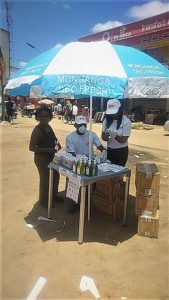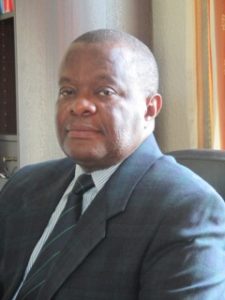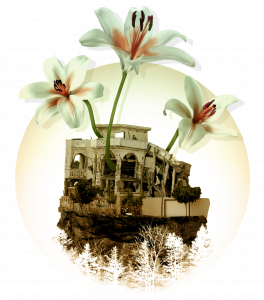
ANALYS Coronapandemin sprider rädsla och panik bland befolkningen i DR Kongo, skriver den kongolesiske journalisten Josef Kafuka. Rykten sprids på sociala medier om att COVID19 är en sjukdom som ”uppfunnits av de vita för att utrota oss”.
Myndigheterna har svårt att vinna gehör för uppmaningar om social distansering, noggrann hygien och undvikande av folksamlingar. Många är vana att förlita sig på traditionell medicinering vilket ökar risken att fler blir smittade. Med tanke på den utbredda fattigdomen vågar myndigheterna inte ta till några mer drastiska restriktioner, som att stänga ner samhället så som man gjort i andra länder, eftersom många redan nu lever på gränsen till svält.
Doktor Jean-Jacques Muyembe, som leder landets Coronavirus Technical Response Unit, vidhåller dock att det är nödvändigt att isolera huvudstaden Kinshasa från resten av landet i hopp om att hejda smittspridningen.
Under de tidigare Ebola-epidemierna kunde DR Kongo räkna med utländskt stöd for att möta krisen. Men nu, när Coronapandemin hotar hela världen är det inte sannolikt att landet får något mer omfattande finansiellt stöd utifrån. Och världens växande ekonomiska kris hotar dessutom att sänka priset på den mineralexport som landets ekonomi vilar på. Vad blir följderna om statens ekonomiska resurser urholkas samtidigt som de offentliga utgifterna borde ökas för att bemöta den hotande hälsokrisen? Är DR Kongo på väg mot en katastrof?
Artikelförfattaren Josef Kafuka är en av de tjugo exiljournalister som deltagit i svenska Reportrar utan gränsers årslånga projekt Kollega till kollega. Projektet, som finansierats av Postkodstiftelsen, har syftat till att ge inflyttade journalister och skribenter från en rad olika länder möjlighet att fortsätta sin yrkesverksamhet i sitt nya hemland. Deltagarna har erbjudits både nya kontakter i den svenska medievärlden och kunskap om hur man arbetar med journalistik i Sverige.
Efter projektets slut kommer deltagarna att fortsätta utveckla sitt nätverk och erbjuda sin kompetens till svenska medier. Mänsklig Säkerhet kommer framöver att publicera artiklar av flera av projektets deltagare.
Artikeln publiceras både på engelska och franska.
CORONAVIRUS in the DR Congo: case of Kinshasa
Kinshasa, the capital of DR Congo is since March 10, 2020, at the announcement of the first case of Coronavirus, the focus of the pandemic in this country of central Africa.But the virus now affects the provinces of Kwilu, Ituri, North Kivu and South Kivu.And since this Saturday, April 18, 2020, the Congo-Kinshasa has just passed the bar of 350 confirmed cases of Coronavirus, according to the epidemiological bulletin of the coordination of the risposte.The country thus has 154 suspected cases under investigation, 35 people cured, 25 cases of death, 190 patients on treatment and in good progress.In reality, these figures are only provisional and change every week.
What local solutions to the pandemic?
In this mega city of Kinshasa, where the majority of the population is used to self-medication and traditional medicine to treat themselves, the images creating buzz on social networks are those of the auction of the medicinal plant ”Kongo bololo”, from its scientific name, vernonia amygdalina. A wild plant that grows in marshy areas and around rivers in the Congo Basin.This plant has since ancient times been used in traditional medicine to cure various forms of malaria.Today, in the streets of Kinshasa, small sellers of ”Kongo bololo” are emerging, jostling sellers of vegetables and tropical fruits (avocados, mangoes, papayas, pineapples …).
Rude is the battle between sellers and resellers, just as rude is also the survival of a population hit hard by an acute food shortage.Tragic illustration reported by the local press: the drama which has just made a family mourn after the deaths of the three children, after having consumed a mixture of ”Kongo bololo” with lemon and ginger.The mother of these three children is arrested at a police station.But in a city where the inhabitants live day by day, many are people who prefer not to believe it, and turn to gossip like ”Coronavirus, it’s a joke”, ”Coronavirus, it is a disease of whites”, ”Coronavirus is like AIDS, an invention of whites to exterminate us” etc…
Thus, four weeks after the announcement of restrictive measures by President Tshisekedi, the report is clear: these health emergency measures are still not strictly enforced, political authorities are struggling to overcome the doubts of a sceptic population who keeps questioning their relevance. Caught in a grip between on the one hand, the health crisis with the drastic measures announced, and the needs of daily survival on the other hand, the inhabitants of Kinshasa display rather a confusing carelessness. The avenues, the streets of the city do not become depopulated, unprotected human interactions are always numerous and will unfortunately increase the transmission of the pandemic, as specialists in the technical secretariat of the COVID-19 Response Committee fear: ” the pandemic continues its slow but vertiginous growth and the benefit of isolation-containment, difficult to apply in DR Congo seems random.The pandemic could reach its growth peak during the first or second week of next May in Kinshasa”. These specialists also alert on ”a significant flow of patients in the medical and sanitary structures of Kinshasa, if the efforts of preparation in progress are not supported and finalized”.
So far, official media reports, ministerial meeting reports, city governor alerts ”Stay at home”, ”Avoid group gatherings and activities …”, and even calls for compliance with the rules of elementary hygiene launched by these ”men of God” and other pastors change nothing. Another illustration of this relative hysteria observed with certain categories of Congolese and this confusion which could gain ground: the case of this bus transporting European nationals towards the airport and which was taken advantage by onlookers of a popular districtfrom Kinshasa. The vehicle was attacked, invective launched against the ”whites who bring the Coronavirus”. An isolated act, of course, but one which translates the ambient ignorance and the refusal to seek to understand a pandemic which is increasingly fearful…
Containment or non-containment, fear everywhere …
Fear has taken hold in all sectors, at all levels. Starting with the political decision-making bodies. According to specialists, social distancing, compliance with basic hygiene rules (washing your hands regularly) are mandatory to effectively fight the spread of Coronavirus. Following the state of health emergency announced by President Félix Tshisekedi, the Ministry of Public Health, while worried about the growing number of contaminations, opened several fronts of a popular awareness campaign against thepandemic: social distancing, compliance with hygiene rules, use of disinfectants, compulsory wearing of masks, restriction of greetings, popular meetings and gatherings, closing of bistros and churchs.
But political leaders are careful not to announce measures that could jeopardize the very precarious food security of the population.Because, for the majority of the inhabitants of Kinshasa, for the working-class districts, confinement is a real domestic nightmare which must be avoided, at all costs. Thus, no politician dares to speak of total confinement in Kinshasa or in other Congolese provinces. The governor of the city of Kinshasa quickly backed away from the temptation to announce such a decision. The mere mention of this radical measure has already led to a spectacular increase in the prices of basic necessities. Suddenly, the question takes a political turn, because the socio-economic consequences of the Coronavirus should not hurt more than the virus itself!
In the meantime, the political actors seem to be retreating, to place the scientist at the center of the stage. Eyes are therefore turned to the Congolese virologist Jean-Jacques Muyembe, charged by the President of the Republic with managing the Coronavirus Technical Response Unit. His latest media outing, during which he announced the imminent arrival of a vaccine candidate, sparked endless controversy. Most of his message was vilified, with reactions disapproving of the tests that would be performed on humans. “We are now chosen to serve as guinea pigs!”writes an activist. While on the other hand, we welcome the initiative, with the hope that this experimental vaccine will become the beginning of a solution.
At the national level, President Tshisekedi has just ordered the suspension for a month of migratory movements between Kinshasa and the Congolese provinces. The government manifested itself a few days ago with a few announcements: launch of the National Solidarity Fund against the Coronavirus, calls for the commitment of economic operators, free water and electricity for two months and now, compulsory wearing of masks, even handcrafted! The army and the police are called upon to ensure compliance with all these measures. However, with the confirmation by the Muyembe’s office, of a budget of 135 million USD essential to truly engage the battle against the Coronavirus, it is now that this Solidarity Fund should be visible and operational. And the Congolese should already attend the declaration of the first contributions!
So, to confine or not to confine? For doctor Jean-Jacques Muyembe, ”Confining Kinshasa is an obligation, and all the authorities agree on this point. We could not limit ourselves to the confinement of Kinshasa and extend the measure to the whole country. To know what is being done elsewhere, on the African continent for example, where certain countries have already adopted this solution.”
Precarious sanitary system, full or selective containment?
Some observers quickly recalled, not without relevance, that this health crisis posed beyond the question of food insecurity, that of the general lack of preparedness of the authorities of a country which, however, had experienced several Ebola epidemics. Indeed, the Congolese government is bankrupt, with a deficit of 5 billion US dollars in its 2020 budget, mainly because of this promise more or less kept until now, to make basic education free. Thus, the collapse of economic activities in Kinshasa could have uncontrolled consequences in all the country with the highlight being the shortage of basic necessities on the markets and the paralysis of political institutions. This would jeopardize social peace throughout the country.
The Congolese state budget deficit is chronic, and makes it lose all credibility to curb the effects of this pandemic. The call for national and international solidarity through the creation of the National Solidarity Fund against the Coronavirus is a perfect illustration of this. The State’s room for maneuver, very reduced in normal times, shrinks dramatically for real social and medical care. During the Ebola epidemics, the Congolese government was able to count on external funding to respond to crises. And sometimes there has been direct foreign substitution by the state in the delivery of health services. But now, with the universal catastrophe of the Coronavirus pandemic, Kinshasa is unlikely to receive significant external funding. And the spreading global recession is likely to further deflate the prices of mineral exports on which the national budget largely depends.
Note, however, these few signals of goodwill: the US Embassy in Kinshasa has just announced an increase in the American contribution to the fight against Coronavirus in DR Congo. This contribution goes from to US $14 million which will be used for training, awareness raising, the purchase of equipment and the local production of protective masks. The United Kingdom has just committed to support Congo-Kinshasa in fighting the COVID-19 pandemic, through assistance valued at more or less 1,875,427 US dollars. This will be granted to the NGO Action Against Hunger to support the National Response Plan against the Coronavirus, in order to save human lives in the city of Kinshasa. While the Office for the Coordination of Humanitarian Affairs (UN) in Kinshasa has just released US $10 million to help cope with the spread of this pandemic, focusing on awareness and popular participation in matters of prevention. This is the place to raise the other major question to which the Congolese government should find an urgent answer: if the resources of the State run out, if the needs for real public expenditure increase, what would we face? A health crisis whose consequences are difficult to estimate? Are we headed for a disaster?
Faced with such questions, Jean-Jacques Muyembe chooses to keep his white coat: ”It is confinement that saved China. To date, there is no other solution that has proven its effectiveness. We mustknow how to survive in the event of famine, war or epidemic. This is what makes human strength. We must learn to adapt …” Even if the Congolese health system is precarious and hospitals lacking equipment, so there is no choice but to bravely face the situation. Total containment is a must. However, some useful clarifications are necessary: ”We are going in stages. Confining a municipality, then extending the measure to other municipalities, to other areas. We are not going to run after the pandemic.”
Confirmation of this approach by another Congolese specialist who maintains that: ”The strategies applied elsewhere have an obvious theoretical interest but cannot be extrapolated entirely here. Some African countries with the same socio-economic conditions as the DR Congo have adopted flexible measures compatible with the normal functioning of low-risk economic activities. These countries imposed the wearing of masks, insofar as the State is capable of providing them. And whatever the response strategy adopted, the wearing masks, coupled with hygienic measures, guarantee minimum protection to maintain certain essential economic activities, which should generate economic conditions essential to the survival of the nation. where it makes it possible to deconfigure territories not affected by the pandemic and who could get on with normal economic activity. Full containment, properly applied, is certainly likely to stop and eradicate the pandemic in a relatively short time. But the price to pay is beyond our reach.”
What about borders?
It is not the borders that must be closed, these are foci of infection that must be identified and isolated, nuance! Health geography and political geography are two very distinct concepts.
 Josef Kafuka
Josef Kafuka
Born in Bukavu in February 1954, graduated from the Faculty Institute of Information and Communication Sciences in Kinshasa, Joseph Kafuka studied communication techniques at the University of South Carolina, in Columbia (USA) .
Vill du skriva en text där du kommenterar, diskuterar eller kritiserar detta inlägg? Kontakta ämnesansvarig redaktör.
Redaktör: Lotta Schüllerqvist, chefredaktör, Press- och yttrandefrihet, Mellanöstern.

Lämna ett svar